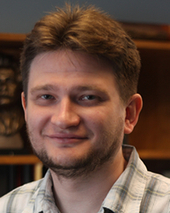Highlight
Transformative Research Award Supports Red Blood Cell Research
Achievement/Results
Dr. Sergey Shevkoplyas, the Ken and Ruth Arnold Early Career Professor in the Biomedical Engineering Department and the IGERT Bioinnovation PhD Program at Tulane University, is the recipient of a highly competitive NIH Director’s Transformative Research Award (also known as TR01). Only 20 awards were given this year, to pursue visionary science that exhibit the potential to transform scientific fields and speed the translation of research into improved health, under the High Risk-High Reward program supported by the National Institutes of Health Common Fund.
The NIH Director’s Transformative Research awards encourage creative thinkers to pursue exciting and innovative ideas about biomedical and behavioral research. The program, established in 2009, promotes cross-cutting, interdisciplinary approaches and is open to individuals and teams of investigators who propose research that has the potential to create or overturn fundamental paradigms. “The Common Fund High Risk-High Reward program provides opportunities for innovative investigators in any area of health research to take risks when the potential impact in biomedical and behavioral science is high,” said NIH Director Francis S. Collins, M.D., Ph.D.
Dr. Shevkoplyas’ TR01 proposal entitled “Eliminating Mediators of Toxicity from Stored Blood” was judged to be high-risk, high-reward and highly innovative. If successful, this project will have a potentially game-changing, transformative impact on the safety and efficacy of transfusions administered throughout the practice of medicine.
With nearly 15 million units of red blood cells (RBCs) transfused to about 5 million patients in the U.S. every year, RBC transfusion is one of the most commonly prescribed therapies for hospital inpatients. Most transfusions involve RBCs that had been stored in an anticoagulant-preservative solution at 1-6°C for up to 6 weeks. During hypothermic storage, a significant fraction of stored RBCs becomes irreparably damaged and the storage medium accumulates known mediators of toxicity as byproducts of RBC metabolism and degradation. Infusion of these toxic mediators and the irreparably damaged cells into the recipient during transfusion reduces the therapeutic efficacy of transfusion and contributes to multiple adverse outcomes in about 1-2% of U.S. citizens every year. The goal of this project is to develop technology for high-throughput removal of irreparably damaged cells and toxic mediators accumulating in the storage medium from RBC units during the transfusion process.
Address Goals
Support from this TR01 reinforces the primary program objective of the IGERT Bioinnovation PhD Program at Tulane University for each student to complete their PhD dissertation research on a translational biomedical research project with an emphasis on transport processes that are fundamental to elucidating and manipulating physiological and cellular systems and are ripe for the creation of biomedical technologies and devices.






